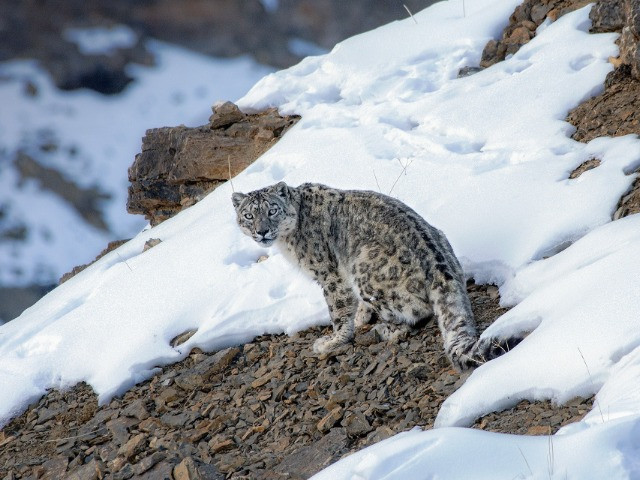National
Mother Nature is a living entity with all corresponding rights
Adding a new term to our conservation lingo, the Madurai Bench of the Madras High Court declared Mother Nature as a living entity, conferring legal and constitutional rights for her safety and survival. The court highlighted the fact that acts of sustainable development sometimes cause more harm and therefore lead to 'sustainable destruction'. By making such acts legally punishable, the court aims to establish checks to protect the natural resources and prevent developmental destruction.
Read more: ‘Mother Nature’ is a ‘living being’ with legal entity: HC I The Hindu
Northwest and central India experience the hottest April in day temperatures since 1901
Parts of the country are experiencing above-normal maximum temperatures, and records reveal that April 2022 was the fourth hottest April in the country's history. Apart from the heatwaves, abnormal rainfall is also becoming a matter of concern. According to India Meteorological Department (IMD), most of April's rains were received by the country's east, northeast and southern parts. Both northwest and central India reported an 84 and 54 per cent shortfall in rainfall, respectively.
Read more: Hottest April on record in north, central India: IMD I The Times Of India
Dr Charudutt Mishra wins the prestigious Whitley Gold Award for Snow Leopard conservation
Having worked on protecting the endangered Snow Leopards for more than two decades, Dr Charudutt Mishra was awarded the UK-based wildlife conservation charity Whitley Fund for Nature (WFN)'s highest accolade, the Whitley Gold Award. Dr Mishra's community-based approach was lauded at the UN Biodiversity Conference as an 'outstanding conservation practice'. Along with his team, he will now work with conservationists across countries, training them on his "PARTNERS Principles" approach to protecting the species. The approach encompasses eight key areas—Presence, Aptness, Respect, Transparency, Negotiation, Empathy, Responsiveness, and Strategic support. This is the second time that Dr Mishra has received a Whitley award, the first one being 17 years ago. He is also the first international Executive Director of the Snow Leopard Trust (SLT).
Read more: Indian Snow Leopard Conservationist Wins UK Wildlife Charity Award I Republic World
More national headlines:
- Exotic wildlife smuggling through NE into India on rise I The Times Of India
- For the first time, King Crow butterfly makes appearance in Indian state of Uttarakhand I WION
- Wildlife in peril as Bengaluru-Mysuru Expressway set to open I Deccan Herald
You may also like to read
International
Climate change and shifting wildlife habitats can lead to increased viral outbreaks
In the next half-century, climate change led movement of mammalian species could lead to more than 15,000 new cases of viral transmissions, a new study predicts. As global temperatures continue to rise, 'first-time meetings' between various wildlife species that have migrated in search of cooler temperatures will create transmission hotspots. The study, which was published in Nature journal, made its predictions based on tested models and simulations over a five-year period. Parts of India and Indonesia will be spillover hotspots where regions with dense human populations will overlap with areas of increased viral exchange.
Read more: Climate change will force new animal encounters—and boost viral outbreaks I Nature
Making children an active part of climate change response
The Climate Action Childhood Network is a collaborative initiative of researchers and educators at childhood centres across Australia, Ecuador, Canada, US and UK, which aims to include children in dialogues on climate change response. Various programmes are designed such that children can engage with the environment around them and comprehend their relationship with water, weather, food, waste etc. For example, during the pandemic, a programme in Ecuador worked to create home gardens across the Cuenca city based on the specific surroundings. The initiative aims to arm the children with essential knowledge to tackle the ecological and environmental challenges that the future holds for them.
Read more: How early childhood education is responding to climate change I Study International
Do protected areas help wildlife? A new study explores
A study published in Nature compared the trends for 27,000 species of waterbirds before and after the establishment of protected areas across 68 countries to show that species-specific management is imperative for conservation success. Although the study focuses on avifauna, the results can be used to devise better conservation outcomes for various other species, the researchers say. The study also highlights a lack of data when it comes to understanding the effectiveness of protected areas in wildlife conservation.
Read more: Protected areas don’t always benefit wildlife, global study finds I The Guardian
More international headlines:
- Global heating risks most cataclysmic extinction of marine life in 250m years I The Guardian
- What is the state of the world’s forests? Could be better, and even help the economy I Landscape News
- 'Very rare' fossil of 450-million-year-old marine animal discovered in Ontario I CTV News
- As 1.5C overshoot looms, a high-level commission will ask: what next? I Climate Home News









